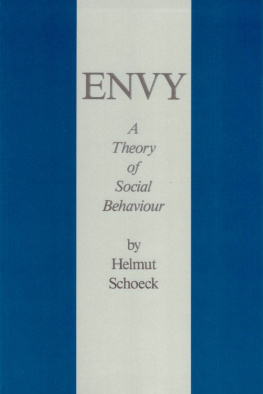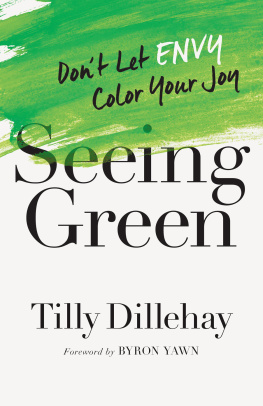3
The Envious Man and His Culture
N o system of ethics , no religion, no popular wisdom recorded in proverbs, no moral fables and no rules of behaviour among primitive peoples have ever made a virtue of envy. Quite the opposite, in fact; by means of the most diverse arguments, human societiesor the men who have to live in a societyhave persistently sought as far as possible to suppress envy. Why? Because in any group the envious man is inevitably a disturber of the peace, a potential saboteur, an instigator of mutiny and, fundamentally, he cannot be placated by others. Since there can be no absolutely egalitarian society, since people cannot be made truly equal if a community is to be at all viable, the envious man is, by definition, the negation of the basis of any society. Incurably envious people may, for a certain time, inspire and lead chiliastic, revolutionary movements, but they can never establish a stable society except by compromising their ideals of equality.
The history of early human thought on the subject of social relations has never, so far as is known, shown evidence of any illusions about the nature of envy.
Most communities have developed or adapted customs and views that enable individual members of a tribe to be unequal in one way or another without being harmed by the envy of the others.
Ethnological material shows how inescapable is the problem of envying and being envied in every aspect of human social existence. The member of a certain social class at a certain stage of his countrys economic or political development, the individual in a certain group situation, every person in a private capacity will, when confronted by the imagined envy of others towards himself, be inclined to see it as a special case. He may console himself: it is the nature of things in the society in which he lives. Given certain conditions, feelings of envy will manifest themselves.
But if one is to realize how little envy depends on specific classifications of difference in status, or on cultural or political stages of development, a thorough and detailed examination of ethnographical material is required. Envy is one of the inevitable accompaniments of human social life, and no anthropology that evades this problem can be regarded as complete.
Thirty years ago Richard Thurnwald wrote:
Among primitive peoples we find the same kinds and the same proportion of dispositional types of temperament as there are among ourselves. They influence each other, fit in together or repel one another. In the play of personalities individuals gain ascendancy and respect as successful hunters, skilled dancers, imaginative singers, effective magicians, cunning killers or impressive orators. Among tribally related families who meet each other on equal terms, individual excellence may be greeted with displeasure and envy. Aversion is shown towards the emergence of a strong leadership. It was not rare for men such as dread magicians to be killed or compelled to flee by their communitiesa primitive form of ostracism. This attitude is, indeed, responsible for the slow rate of cultural growth because it resists innovation.
Are any societies devoid of envy?
Wherever in a certain culture we do find institutions which appear to take no account of envy or jealousy, they are exceptions which do not invalidate what has been said above. Many African tribes, for example, which practice polygamy, have a norm prescribing that the husband must show strict impartiality, sharing his favours equally between all his wives. The Kriges clearly demonstrated this in the case of the Lovedu, among whom the wives, who have their own individual huts arranged in a semicircle around their husbands, always keep a careful watch to see if he spends just a little too much time in one of them, or singles out one particular wife. If a wife enjoys only two to four hours in the day of a husband whom she shares with others, she guards these as jealously as a monogamous wife who can lay claim to her husband against other females for the whole twenty-four hours. Polygamy does not exclude susceptibility to sexual jealousy, which is universal among human beings.
It is equally false to speak of a relatively unenvious society because, for instance, it has no salary taboo as a device to obviate envy. The Swedes regard themselves as an envious people, and there is an expression royal Swedish envy. And in some states democratic vigilance demanded that every civil servants emoluments and expenses, together with his name and place of residence, should be recorded annually in a book available in every public library. Anyone hearing of this institution might conclude that Americans were little plagued by envy, for if they were, they could not afford thus to publicize salaries. But as may be observed, the frankness shown by the Department of Finance not infrequently leads to personal conflicts such as the salary taboo elsewhere seeks to avoid.
The more data comparative cultural anthropology provides, the more evident it becomes that we cannot infer, from the lack of certain institutions and typical practices, a corresponding absence of any one basic human drive. This applies especially to envy. Individual cultures have evolved various, sometimes of course rather weak, mechanisms to enable their members to get along with each other despite envy.
It is not easy to test a theory about envy. The existence of the motive of envy can, of course, be proved, where there is express mention of envy or of concern about it, and most languages have a word for it. Again, if a person wants other people to have less than he has or nothing at all, instead of granting others the right to have more, or if he inflicts damage on another without himself benefiting thereby, envy can at least be assumed. It is more difficult to find evidence for the absence or minimal role of envy in a culture or in a given social situation. At best it could be said that someone had been able to suppress his envy and hence to accept the others privilege or advantage with good grace. But it is virtually impossible categorically to declare that in a given social situation or custom none of those involved feels envy. Yet we are fully justified in believing a man who, at an interview, spontaneously admits to being envious. He would be generally much more likely to conceal the fact. But we cannot implicitly believe anyone who maintains that this thing or that would not arouse his envy.
Nor are we any the wiser if we conclude from the existence of certain social institutions such as primogeniture or polygamy that there is no envy or jealousy. Not infrequently these very customs give rise to black magic or other modes of behaviour which show that anyone who is injured by the institutionally tolerated behaviour of, say, father or spouse, is in a favourable position to react enviously. Again and again in ethnographical literature we come upon accounts of sons who killed the brother favoured by primogeniture, or of a first wife who killed a second or third wife, despite the general custom of polygamy in her tribe.
Social life would be impossible if cultures did not succeed within reason in forcing those who have real cause for envy or jealousy to co-operate. For after all, a society in which there was never cause for envy, a society of total and constant equality, would not be workable even as a theoretical experiment. Thus in some tribes a father, especially if he is a medicine man, will bequeath his magic tricks to the eldest son only, much to the jealous anger of the others. And yet as long as such a tribe finds it essential to believe in magic in order to endure the threat of adversity, it is clearly good sense for that power not to be diffused throughout the group. Magic which is common knowledge is not magic at all. Thus all we can ask is how well or how badly a society has eliminated, deflected or restricted envy in certain spheres of life. We can never say that in such and such a culture and such and such a social situation none of the participants is envious or jealous. Rather, some cultures may successfully attempt to achieve a condition in which much social activity can proceed as if there were no envy .







